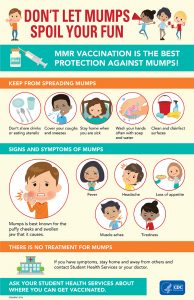Important Mumps Information
As of February 10, 2017, at least 15 college campuses in Missouri had reported a suspected mumps case during the past six months. College students are at a higher risk for contracting mumps than the general population because they are more likely to have congregate living arrangements, such as a residence hall or shared house.
The Missouri Department of Higher Education has partnered with the Missouri Department of Health and Senior Services (DHSS) to provide prevention message standards for colleges and universities that wish to disseminate information to students. The goal is to provide students with key factual messages that will allow them to protect themselves from contracting mumps and spreading the virus to others.
Current Situation
Mumps has been circulating on college and university campuses in Missouri since Fall Semester 2016. The largest number of cases at one campus is at the University of Missouri-Columbia, with 334 confirmed and probable cases reported as of February 8, 2017. Fourteen other Missouri campuses have had at least one case reported during this timeframe.
Disease Information
Mumps is a contagious disease caused by a virus that is spread through contact with an infected person’s saliva, or spit. It is commonly passed through coughing, sneezing, or talking. It can also be spread through contact with objects that others have touched with unwashed hands, or that come in contact with saliva, like eating utensils.
The most recognizable symptom of mumps is parotitis, or swelling of the glands around the jaw. Other symptoms include: pain with opening or closing the jaw, fever, fatigue and malaise, headache, and earache. More serious complications can occur, including swelling of the testicles in males, swelling of the ovaries and/or breasts in females, swelling of the brain, meningitis, pancreatitis, and deafness.
Treatment for mumps involves reducing symptoms through hydration, rest, and fever/pain reliving medications, but the only way to cure it is to wait for the body to fight off the infection. Most people with mumps recover completely within a few weeks.
Prevention
The best way to prevent mumps is to get the measles/mumps/rubella (MMR) vaccine, if you have not already had two doses and do not have a medical reason not to get the shot. Your medical or shot records should show when you received the vaccine, which is commonly given in childhood. You can also avoid sharing items like eating utensils or cups that come into contact with saliva.
You should stay home if you are sick with mumps to avoid spreading it to other people. A person with mumps can spread it for at least two days before and for five days after symptoms begin.
If you are diagnosed with mumps, you may be contacted to discuss your illness and to talk about any person you may have come into contact with while you were ill. This to make sure that you are feeling better and to keep others from getting ill, and any information that you provide will be kept confidential.
Questions? contact UMKC Student Health & Wellness
See also this informational flyer
